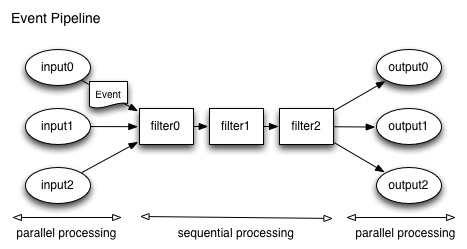Lightweight log/event processor.
Goals:
- fast
- easy to deploy
- simple configuration
Concept:
The underlying idea is a very simple concept that is based on pipes and filters. An event gets registered by an input, put through a couple of filters and in the end is published by an output.
[shell1] $ wget http:https://dirtyhack.net/d/translog/latest/translog.linux-x86_64 -O translog
[shell1] $ chmod +x translog
[shell1] $ echo "
[input.File]
source=file0
[filter.KeyValueExtractor]
[output.Stdout]
" > translog.conf
[shell1] $ chmod a+rx translog
[shell1] $ ./translog -config demo.conf
[sheel2] $ echo "foo=bar baz baz baz" >> file0
[shell1]
2013/09/27 18:01:54 [inputProcessor] register *translog.FileReaderPlugin
2013/09/27 18:01:54 [filterChain] register *translog.KeyValueExtractor
2013/09/27 18:01:54 [outputProcessor] register *translog.StdoutWriterPlugin
2013/09/27 18:01:54 [EventPipeline] 0 msg, 0 msg/sec, 0 total, 5 goroutines
2013/09/27 18:02:04 [EventPipeline] 0 msg, 0 msg/sec, 0 total, 6 goroutines
<#Event> Host: bender.local
Source: file:https://file0
InitTime: 2013-09-27 18:02:10.40223812 +0200 CEST
Time: 2013-09-27 18:02:10.402238172 +0200 CEST
Raw:
foo=bar baz baz baz
Fields:
[foo] bar
2013/09/27 18:02:14 [EventPipeline] 1 msg, 0 msg/sec, 1 total, 6 goroutines
CTRL-C
$ git clone https://github.com/invadersmustdie/translog.git $ cd translog $ rake prep $ rake $ ./bin/translog -h
[input.File]
source=/var/log/nginx/access.log
[filter.KeyValueExtractor]
[output.Statsd]
host=metrics.local
port=8125
proto=udp
field.0.raw=test.nginx.runtime:%{runtime}|ms
field.1.raw=test.nginx.response.%{RC}:1|c
Q: Why not use logstash?
A: First of all, logstash is awesome. It's the tool of choice if you want to do enhanced log/event processing. Translog does not intend to replace logstash at all. It just provides a lite alternative if you want to have real simple log processing.
Q: How about more plugins for translog?
A: As translog tries to keep the number of dependencies down (to zero) I'm really careful about adding new plugins. If you need to work with redis, elasticsearch, ... use logstash.
Q: What throughput can it handle?
A: There is no real answer to this question because it depends on the filters and configuration given. In general you will see a drop in throughput when using complex regex patterns.
On my local box (MBP2012 2.7GHz 8GB SSD) (-cpus=1) it achieved the following numbers:
- 1x FileReaderPlugin
[input.File] source=tmp/source.file0
-> 52540 msg/sec
- 1x FileReaderPlugin + 1x KeyValueFilter
[input.File] source=tmp/source.file0 [filter.KeyValueExtractor]
-> 5168 msg/sec
- 1x FileReaderPlugin + 1x KeyValueFilter + 1x FieldExtractor
[input.FileReaderPlugin] source=tmp/source.file0 [filter.KeyValueExtractor] [filter.FieldExtractor] field.visitorId=visitorId=([a-zA-Z0-9]+); field.varnish_director=backend="([A-Z]+)_ field.varnish_cluster=backend="[A-Z]+_([A-Z]+)_
-> 4926 msg/sec
Reads raw messages from tcp socket.
Example
[input.Tcp] port=8888
Reads messsages from file.
Example
[input.File] source=tmp/source.file0
Reads messsages from named pipe.
Example
[input.NamedPipe] source=tmp/source.pipe0
Extracts key/value pairs from raw message.
Example
[filter.KeyValueExtractor] # no configuration
Extracts value from raw message and adds it to event. Regex pattern named in first group (parenthesis) will be used.
Example
[filter.FieldExtractor] debug=true field.visitorId=visitorId=([a-zA-Z0-9]+);
Drops event by matching field or raw message.
Example
[filter.DropEventFilter] debug=true field.direction=c msg.match=^foo
msg.match also support inverted behaviour, this means allowing patterns insteads of permitting them. This can be achieved by putting a '!' in front of the pattern.
Example
[filter.DropEventFilter] msg.match=!^foo
Modifies fields for event.
Currently supports:
- removing fields by name or pattern
- substituting patterns in raw message
Example: modifying fields
[filter.ModifyEventFilter] debug=true field.remove.list=cookie,set-cookie field.remove.match=^cache msg.replace.pattern=foo msg.replace.substitute=bar
Example: modifying raw message
[filter.ModifyEventFilter] debug=true msg.replace.pattern=foo msg.replace.substitute=bar
Example: modifying raw message with backref
Inside substitute, $ signs are interpreted as in Expand, so for instance $1 represents the text of the first submatch.
[filter.ModifyEventFilter]
debug=true
msg.replace.pattern=foo=([a-z]+)
msg.replace.substitute=bar=${1}
before: "[2013/10/18 12:01:02] Sed non pharetra leo. Vestibulum aliquet porttitor foo=baz xx" after: "[2013/10/18 12:01:02] Sed non pharetra leo. Vestibulum aliquet porttitor bar=baz xx"
Writes internal structure of message to stdout.
Example
[output.Stdout] # no configration
Sends message in graylog2 format to given endpoint.
Gelf format: https://github.com/Graylog2/graylog2-docs/wiki/GELF
Example
[output.Gelf] debug=true host=localhost port=12312 proto=tcp
Writes messages into named pipe (fifo).
Example
[output.NamedPipe] debug=true filename=/var/run/out.fifo
Sends metrics to statsd.
Example
[output.Statsd]
debug=true
host=foo.local
port=8125
proto=udp
field.0.raw=test.nginx.runtime:%{runtime}|ms
field.1.raw=test.nginx.response.%{RC}:1|c
field.2.raw=test.nginx.%{foo}.%{bar}:1|c
Writes raw message to network socket.
Example
[output.NetworkSocket] debug=true host=localhost port=9001 proto=tcp


